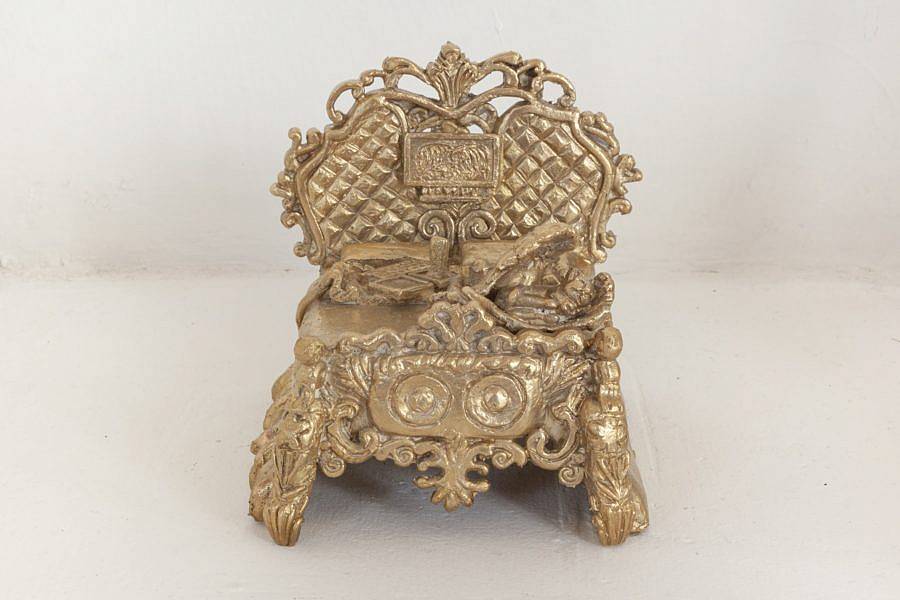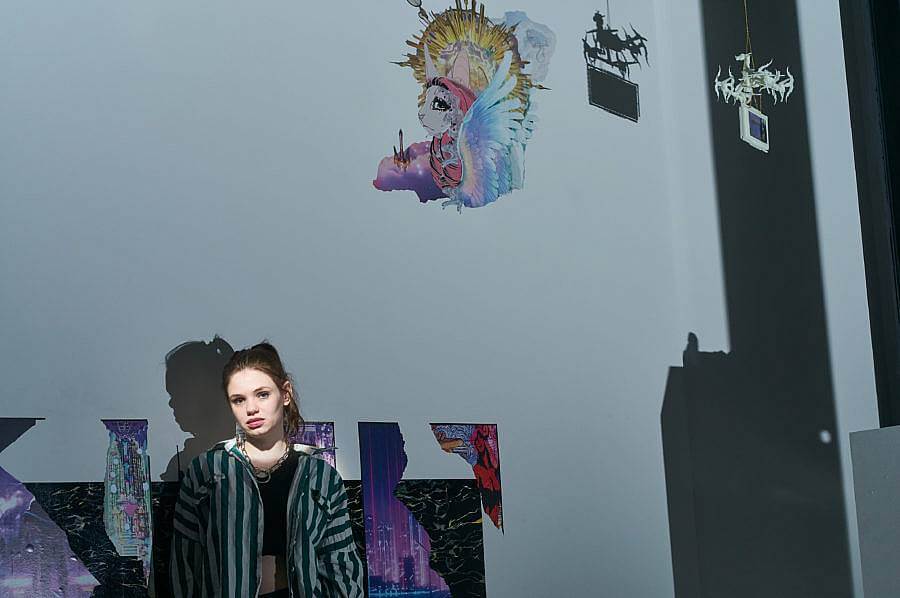What are some current projects you’re working on?
Right now, I’m working on a piece that is a narrative map of historical events that seem to be disconnected, all of which mark dramatic shifts in the distribution of power or are imbued with so much political significance that they have become synonymous with a social movement or political ideology. It’s basically a “Here be dragons” fantasy world map, but each area will engage a place in our own world that is tied to a historical narrative I will adapt into the lore of the world I’m building.
This idea came to me three years ago after I visited the Sachsenhausen concentration camp outside of Berlin. Sachsenhausen is bizarre. It was the first Nazi prisoner of war camp, then it became the Nazis’ first official concentration camp, then it became a Soviet POW camp, then it was bulldozed and made into a Soviet memorial to the victims of the Holocaust, then it became a reunified German memorial to the victims of both the concentration camp and the Soviet prison camp. Visiting Sachsenhausen spun me out. Since then I have been invested in physical sites where significant political upheavals occurred, and how memory, history, and the dead are animated by states to lend credence to their operating ideologies.
I just finished a body of work about an angel who lives in a heaven of the now that has everything a young person could want to live a life of perfect ecstasy: dancing, sex, drugs, motorcycles, cats, giant beds, crazy rococo decorations, and lots and lots of computers. I designed a heaven that was like every Saturday night I would want to have in one endless tower that goes up and up into the sky. Below it, I created a purgatory that was like a 1980s cyberpunk dystopian future, but instead of daemons, it had gargoyles. I struggled with this because I didn’t want to just imagine a hell to counterbalance the heaven. I try to justify it by being like, “Oh, I’m Jewish, we don’t do hell.” But we also don’t do purgatory. I like the idea of purgatory, because I find the punitive logic of hell to be off-putting, and it stunts my ability to imagine. But purgatory is much more present to me in today’s world.
I came to the project from two places. The first was technology and the discourse of “progress” under capitalism. I asked myself, What is technology at its most free? What would a city be like if it was totally driven by technology? The reality of it might be mundane. We have only known the Internet, computers, robotics, and AI under capitalism, so when we imagine those technologies in extremity, we imagine them within the extremes of capitalism. That was the basis for my city of purgatory. The tower of heaven was not exactly the opposite, but rather an utopian extension of the same concept. What are the most kitsch, cliché, childlike, or debauched technological dreams? Can we walk through the Internet? Can we create technology and enjoy it without the labor needed to make it? Can we have technology without depleting resources? The purgatory city and the tower of heaven became two drastically different, but still romantic, visions of acceleration. Acceleration itself is simultaneously both romantic and inevitable. The second approach was to imagine a culture of luxury and leisure. In a world with perfected technology, with full automation, would we live like an endless Saturday night? In heaven, would the appeal of technology and decadence still in large part be derived from its exclusivity?
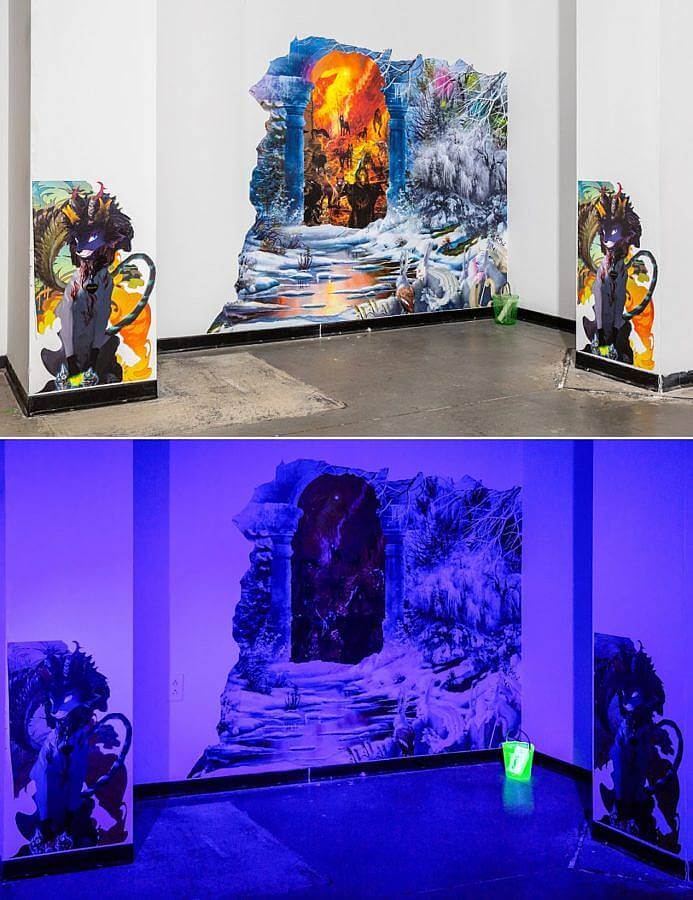
What’s your process like? Is it research based?
Yes, it is. Usually I will be reading down my endless reading list and find something that strikes a chord. For Redwall and My Dead Pets, it was a piece by Boris Groys. For Winter4eva, it started with Jean-Luc Nancy’s After Fukushima. When I realize I want to be more involved in a subject, I will do focused research connected to the first text that sparked my interest. For instance, After Fukushima led me to Nuclear Fear: A History of Images, which is about the history of radiation in the American subconscious. That was when my project really took off.
What are you currently reading?
For pleasure, I read a constant stream of fantasy books, or rather, they’re audio books and I listen to them. Currently, I’m listening to The Mirror Visitor Quartet. It’s this French fantasy series by Christelle Dabos about a world that was smashed into pieces. People live in sections of it and cloud castles drift around them.
Then I have my halfway pleasurable, halfway research reading, which are books I buy, read more slowly, and sometimes take notes on. Right now, I am working through The Hotel Years by Joseph Roth. Roth was a Jewish Austrian reporter. He was born in 1894, and lived through both World Wars. The book is a collection of essays he wrote while traveling through Western and Eastern Europe after WWI. The theme, as he explains it, is that he only feels at home in hotels, not in any city where he stays, but in the old world glamor of hotels, which at the time were much cheaper, because in them he can momentarily pretend to be rich and well-connected. The book is full of anger at the world after the war. One of the first essays is a rant about how he thinks the world has gone mad after he sees a homeless solider who is missing a leg and carrying a dog on his back. Roth is driven to despair at the idea that we now live in a world where a man must carry a beast for friendship and protection. Other essays in the book are beautiful descriptions of cities before they were destroyed in WWII. I also just finished Gingerbread by Helen Oyeyemi, which is a great novel. Oyeyemi is known for narrative tapestries where fictive histories and familial realties are spun together in such a way that the reader can’t tell them apart. It’s moving. I hope to bring a similar quality to my artwork by using fiction to heighten real historical narratives for viewers.
For research, I’m reading a lot of Jewish history. I’m hoping to make artwork that engages the uses and misuses of discourses about anti-Semitism, especially how accusations of anti-Semitism are used to suppress criticism of Israel.
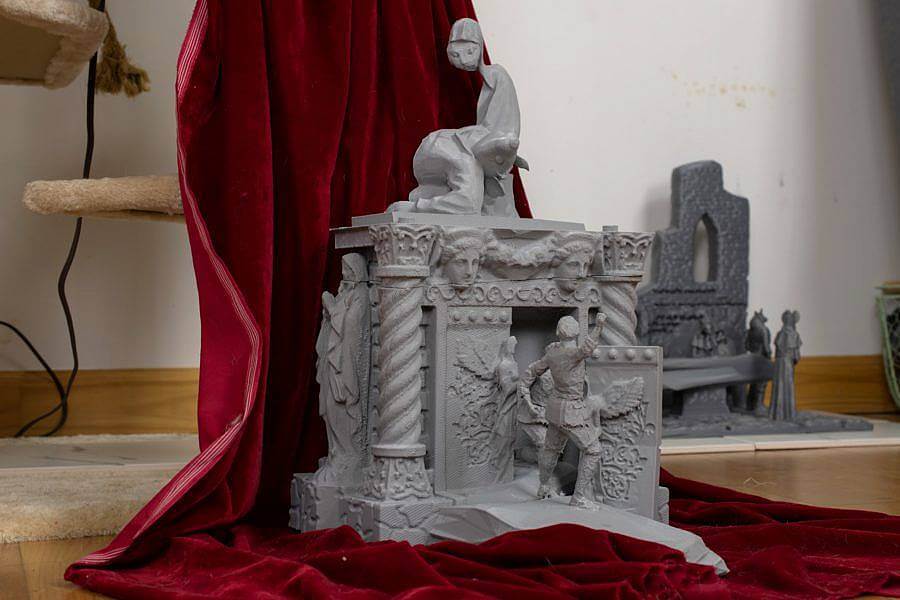
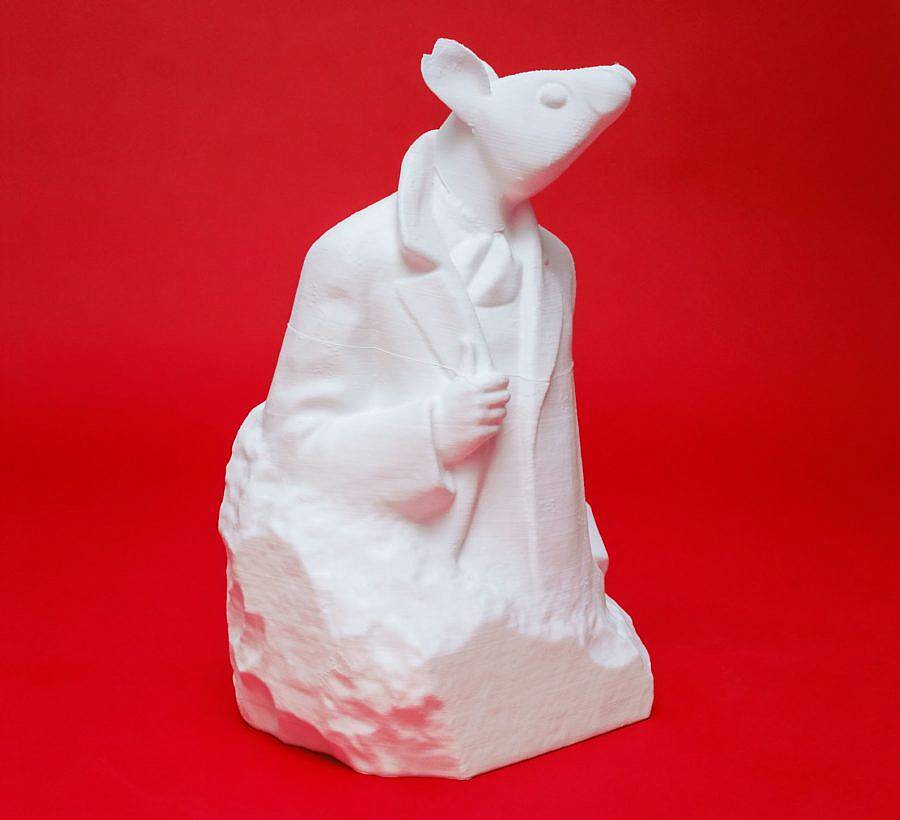
The narratives in your work seem inspired by science and pseudoscience, utopias and dystopias. What interests you about these themes?
I’m not interested in making propaganda for my political beliefs. But I am interested in making art that scrutinizes potential futures, especially those futures that my politics might bring into being. I am a communist. I spend a lot of time complaining about the present and mulling over how the present developed out of the past. I spend maybe less time then I should thinking about how things could be better. Some of my artwork, especially the work about technology, is an attempt to use narrative to understand historical developments. We always mythologize progress, whether scientific or economic, and those myths are a rich resource for understanding how people have viewed the passage of time and how humans have changed through it. But my best work starts with envisioning an appealing utopia and then ripping it apart.
Your piece Winter4eva is based on fictional characters and their desires. Similarly, Redwall, But For Your Dead Pets Only anthropomorphizes animals that were used in the Space Race. What drives you to create work out of fictional narratives?
I’ve always loved fantasy. Fantasy worlds are didactic: there is good and bad. Fantasies are often conservative. Many fantasy myths rely on things I find abhorrent, like someone’s family lineage giving them the right to rule over other people. And yet, I have always been drawn to their imagery and their shameless approach to drama. My use of fantasy is a form of self–subversion but it also gives me everything I secretly want.
I had a studio visit with Leigh Ledare and he described my work as perverse, which, coming from him, I took as a compliment. He’s right, I do use high octane, sugary images of girls and cats and dragons, and I know it’s a bit taboo, but it gives me genuine pleasure because I love those things. It also gives me the pleasure of doing something that is considered immature or culturally abject.
The creation of characters I grow attached to and stories I’m invested in are what motivates me to work. Making art can be embarrassingly difficult. It’s something I have the privilege to do, and which involves a lot of self-advocating and insistence, and yet, I still struggle to make art. These stories are a way of moving myself forward, because they are something I genuinely love that is outside of myself. They are not just me making art because I want to be an artist, or because I have something I think other people should see or know.
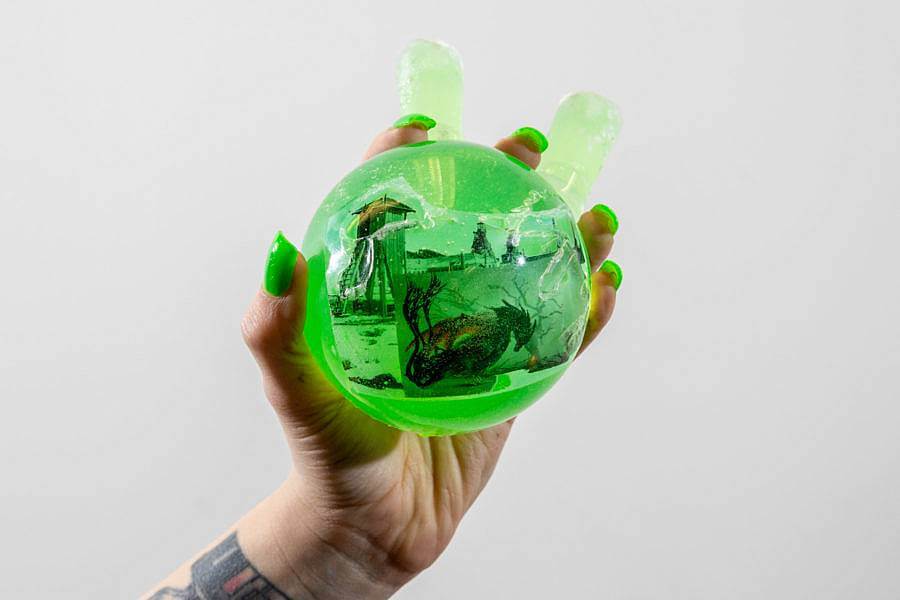
What are you really into right now?
Trains. Model trains, real trains. I’m just into trains right now.
Who is your dream collaborator?
I love Emma Pryde’s artwork and we have spoken about collaborating in the past.
I’d like to collaborate with a construction-based artist who works on a large-scale and makes architectural work. My brain doesn’t function on that scale, so it would be useful.
Last year, I was contacted by Crucible NYC.Crucible is a service connecting artists to an international network of fabricators working in rare techniques. Right now, they are based in New York and West Africa, but want to expand. Crucible wanted to find an artist who worked in 3D to produce three small designs by them in brass. The sculptures we made together were in my show at Lubov in NYC. I got to keep the finished pieces and they used the collaboration to promote Crucible. I can’t recommend working with them highly enough. It made me realize that my ability as a designer, and the way I think in terms of character and narrative, means that my work can lend itself to collaboration with artists who are more focused on materials.
How has your perspective as an artist changed over the years?
I started making art in 2013 at the height of Obama-centrism and a widespread notion of the arts as being “above politics.” I felt like I needed to make work that was serious with a capital S. No colors, almost no images. My work was almost all text. I had this shift where I realized the work had to carry itself. I realized it would be more sustainable for me to make work I actually liked looking at.
I had imposter syndrome in the past. That’s gone away with the pressure of being in grad school and making art, because you don’t have time to have existential crises about whether or not you deserve to be an artist. You just have to put your head down and work, and then, after a while, you forget you were even questioning it. How self-important is it to think that what you do is so special that you have to earn the right to do it? Who better to make art than an imposter?
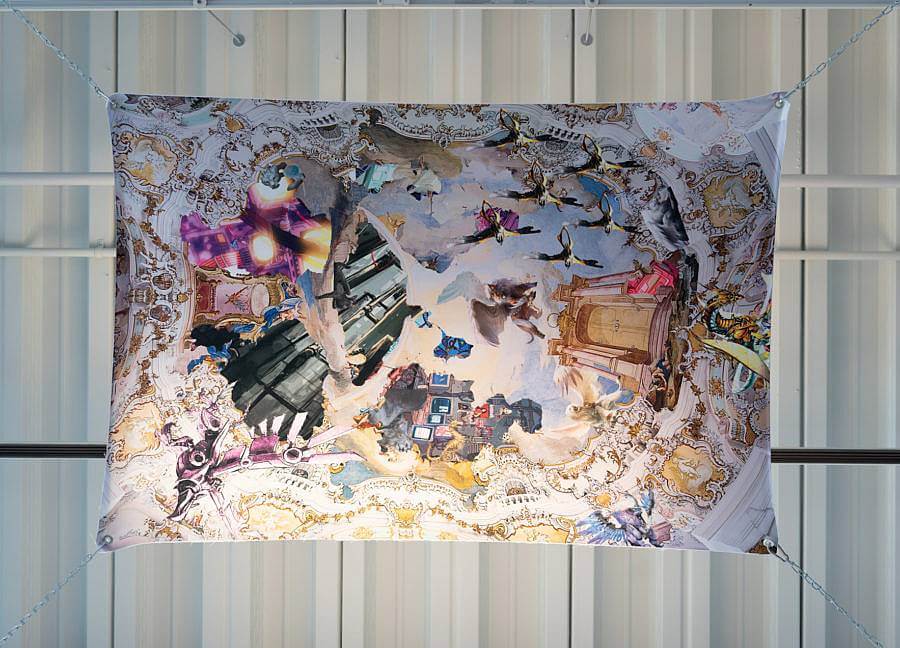
What’s it like living and working in New Haven?
Just don’t make me move back to Portland, Oregon! New Haven is an interesting place. Anything north of Philadelphia on the East Coast is new to me. I expected it to be like Washington D. C., where I lived most of my life. But it’s not. Yale has done a number on the city, which is true for a lot of university towns. Private schools should be required to admit a percentage of people from the exact zip code they are in every year. The first time I came to New Haven, when I was applying to the MFA program, the guy who ran the Airbnb I was staying in called me and said he had an emergency and needed to move me somewhere else. OK, sure. I ended up at what was clearly just an abandoned warehouse with cots in it, right next to the train tracks. It still had filing cabinets with papers in them for the people who had worked there and this terrifying communal shower room painted institutional orange. There’s a lot of forgotten things in New Haven. When I first moved here, I couldn’t stop thinking about that Angela Carter story about Lizzie Borden killing her family with an axe. Carter really empathizes with her. I read it as a kid and the description of the insects and heat stuck with me. I was like, “Yeah, I would cut my dad’s head off too if he made me dress like that.” When I moved here it was so hot and I felt so weird, I was like, I’m Lizzie Borden. Then I realized that story took place in Massachusetts and I’d been confusing Connecticut with Massachusetts my whole life.
Do you have any big plans for when you’re out of school?
This is a terrifying question. No specific plans yet. I have a lot of projects in mind, continuing with trains, history, and politics. I hope to get a research grant so I can travel to places like the former DDR, Poland, Ukraine—essentially post-Soviet Eastern Europe. I would like to incorporate that history into my practice more.
